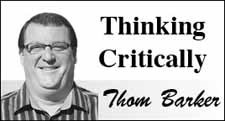Right-wing and left-wing are meaningless terms. Canadians are dissatisfied with democracy. We need a new way to talk about politics.
Last week in three federal by-elections, voter turnout averaged just over 36 per cent. Immediately, pundits ruminated on the apathy of Canadian voters. One blogger called it an "assault on democracy."
I'm not so sure it's about voter-apathy as much as it is voter-confusion. We live in an increasingly complex political environment where the old simplistic terminology simply doesn't apply anymore.
The terms right and left originally described the seating arrangement at the French National Assembly in 1789 following the French Revolution. Supporters of the king sat to the right, supporters of the revolution to the left.
From there it is easy to see how right would become associated with 'conservative' (i.e., protecting the status quo) and left with 'liberal' (i.e., seeking reform).
In Canada, the distinction is fairly murky right from the get-go. Before confederation (1867) the right-left split was basically along economic lines and roughly fit the terminology. In a nutshell, conservatives favoured a protectionist tariff system for trade with nations other than Great Britain (status quo) while liberals favoured free trade with the United States (reform).
Meanwhile, Quebec had its own right-left split along religious lines. The Conservative Party of Quebec (Parti bleu) sought to maintain the Catholic Church's role in society (status quo) while the Parti rouge advocated separation of church and state (reform).
At this time, Canada was virtually ungovernable, which led to an uneasy coalition between Ontario Conservatives and Liberals under Sir John A. MacDonald and George-Étienne Cartier's Quebec Conservatives.
MacDonald died in 1891. Without his firebrand leadership, the conservative coalition quickly unravelled, particularly under the pressure of English-French tension exacerbated by the Red River Rebellion and Manitoba Schools Question.
Sir Robert Borden led the next Conservative revival against Prime Minister Sir Wilfrid Laurier. With a little help from anti-Laurier Quebec nationalists under Henri Bourassa who successfully painted Laurier as an British imperial apologist, Borden ran a great campaign against free trade. World War I solidified Borden's power, as he was able to piece together a coalition with Liberals and even one Labour MP. The 1917 conscription crisis, however, left the Conservatives in the wilderness in Quebec for decades.
After the First War, a new term entered the vernacular to further muddy Canadian political waters: 'progressive.'
The Progressive Party of Canada was formed by Liberals who had broken with both Borden's Unionist Party and the Liberal Party under William Lyon MacKenzie King.
During World War II, it was conservatives who tried to take on the mantle of 'progressive,' forming the Progressive Conservative Party of Canada (PC).
For most of the rest of the twentieth century the Liberals and the PCs would trade off in government (with quite a significant edge to the Liberals). But it became increasingly difficult to see a distinction.
The Conservatives under John Diefenbaker gave us the first female cabinet minister, the first Aboriginal member of the Senate and the Canadian Bill of Rights.
The Liberals under Pearson brought us universal health care, the Canada Pension Plan and our own flag.
Trudeau patriated the Constitution. Mulroney gave us free trade.
In other words, the parties can call themselves whatever they want, but in order to win elections and sustain power they must be centrist and intrinsically indistinguishable from each other.
Stephen Harper is a perfect example. Despite ridiculous claims about fascism, secret agendas etc., basically Harper cobbled together a liberal-conservative coalition that governs, of course, more or less in the centre.
Unfortunately for Harper, in order to get to his majority he had to embrace the lunatic fringe.
The new right is a total conundrum. It has nothing to do with maintaining the status quo. Self-identified right-wingers seek to tear down modern society by re-establishing the privilege of angry white men to dictate terms. They rail about freedom while attempting to legislate morality and re-establish the link between church and state. They are "reformers." Does that not make them left-wing?
For the most part, Harper keeps these backbenchers under wraps. They occasionally embarrass themselves and the ridings they represent, but they have very little actual impact on government.
The new left is equally puzzling. Self-identified left-wingers are increasingly protectionist. They seek to maintain the status quo and block free trade (mostly on environmental grounds). Does that not make them right-wing?
Most Canadians don't even know what the terms mean anymore. And most of us don't identify with specific parties anymore. We are issue-oriented. Many of us support what would traditionally be called right-wing and left-wing policies on a case-by-case basis.
It is virtually impossible in today's complicated world to maintain the ideological rigour required to support a right-wing or left-wing worldview as those who have proudly co-opted the terms have redefined them in their own image.
Small 'c' conservatives and small 'l' liberals do not use the terms right and left any more, they self-identify as progressives or moderates.
Canada has always been about compromise. We give a little, we get a little and we make incremental progress. It has given us pretty reasonable government for a long time despite the apocalyptic proclamations from the fringes.
A poll released last week by Samara indicated only 55 per cent of Canadians are very or somewhat satisfied with the way democracy works in this country. We probably need to take a long hard look at that. We need a new way to talk about politics.




